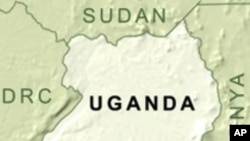This is Part Two of a five-part series on Oil Contracts in Uganda
Continue to Parts: 1 / 2 / 3 / 4 / 5
In Uganda, critics argue for public access to details of contracts between government and oil companies.
When billions of barrels of oil reserves were found in Uganda five years ago, the discovery seemed like a gift from heaven to many in this East African, poor, landlocked country.
But as Douglas Mpuga reports in this first of a five- part series, Uganda’s oil sector has so far been characterized by high level secrecy that critics say is unlawful.
Oil wells are expected to start pumping within five years, and bring along with it about two billion dollars per year, according to government officials.
Many analysts are hopeful that could propel Uganda into the strata of middle-income countries, where few sub-Saharan African countries rank. A refinery will be built – providing revenues for improved roads, bridges and other infrastructure.
Three foreign companies are involved in oil exploration in the country: UK-based Tullow Oil, which has been operating in Uganda since 2006, and two other companies to which it has sold part of its investments -- France's Total SA (TOT) and China's CNOOC Ltd.
The government has signed deals with the companies. But few Ugandans know what is in the agreements. The government insists that it will not release details of the agreements citing confidentiality clauses that bind it and Parliament from disclosing their contents to third parties.
Two senior Ugandan journalists took government to court seeking this information after the failure of repeated calls for the release of the details.
“We are suspicious why the government wants to handle this oil exploration program with a lot of secrecy,” said one of the journalists, Charles Mwanguhya Mpagi, the political editor of The Daily Monitor newspaper. “We are looking at examples such as Ghana where they have their agreements on the internet. We are looking at Norway which has this information available.”
According to Mwanguhya Mpagi: “We suspect government has always been reluctant to share information with the Ugandan public. The other thing we have been told, from what has leaked out, is that the agreements are not entirely bad. So we are puzzled why the government is reluctant.”
But the legal process has not been smooth: a lower court dismissed the journalist’s initial request but now the High Court may consider the appeal.
“Our initial petition to the court was not limited,” said Mpagi, adding “What we asked government to do was to rely on the constitution to be more transparent in its dealings with the oil industry, what agreements it is entering into with the prospectors.”
“We lost in the lower court, “ he continued, “because the magistrate wasn’t convinced that accessing this information would benefit the Ugandan public. But he forgot that we are journalists who would share this information with the public. This is what we intend to push for in our appeal.”
The journalists’ campaign has been boosted by four organizations seeking to become party to the case. Describing themselves as friends of the court, they say they are advocating for the right of the public to know about national and regional energy policies that aim in part to help eradicate poverty.
Meanwhile, Ugandans wait for the day when the first barrel will be exported.




